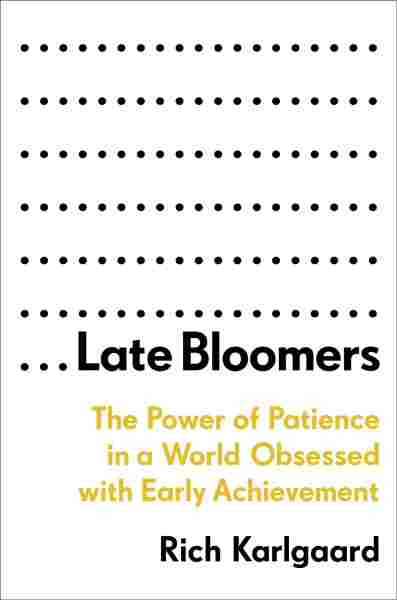Einstein reportedly started to speak only at the age of 4, but that didn’t prevent him to become one of the greatest physicists living ever. Colonel Sanders started his KFC franchise in his sixties. J.K. Rowling wrote Harry Potter when she was 30 and after she suffered a failed marriage and a miscarriage…. there are a lot of people who achieve successes late in life rather than early. But why our society is overlooking the former group and is obsessed with the later?
This is the question that I asked myself when I was reading ( or rather, listening) to the Rich Karlgaard’s latest book Late Bloomers: The Power of Patience in a World Obsessed with Early Achievement.

First, some background about the author. Rich Karlgaard is now the publisher of Forbes magazine. But notwithstanding with his current achievement, his career path isn’t always smooth. After having a mediocre academic career at Stanford ( which he got into by a fluke), he worked as a dishwasher, a temporary typist and a security guard, before he discovered his inner motivation, which led him to startup a tech magazine in silicon valley, and now he is the publisher of Forbes magazine.
Rich Karlgaard is not your prodigy, but he achieve a career height that a lot of prodigies failed to achieve.
In the book, Rich enumerates a list of people who were deemed as mediocre or even failure in their early lives, but then went on to achieve great successes in their late years. These late bloomers are a great encouragement to me, who is about to approach the age of 40 and yet is still unaccomplished as I was some 20 years ago.
In the book, Rich also provides scientific explanations of why so many of us bloom later in life. One of the reasons is that the executive function of our brains– that is, the ability to self-control. focus on goals and to be more open minded– doesn’t mature until the age of 25 or later.
In the business and corporate world, fluid intelligence–the raw brain power needed to solve mathematical and logical problem or a problem with a well-defined scope— matters a lot less than crystal intelligence– the ability to synthesize past experience and knowledge in order to solve a vague problem.
Generally speaking, child prodigies usually excel in fluid intelligence, and usually excel in the logical deductive fields such as chess, mathematics and physics. But in business and corporate world, you need more of crystal intelligence, and less of fluid intelligence, for the simple reason that the real world is messy, and the solutions to the problems that can be solved by pure deductive power are cheap to obtain. Once the solutions to Heat Problem are known, there is no longer a need to reinvent them again, one can just purchase the academic textbooks ( or the computer packages) to apply the solutions. Which is why you don’t make as much money if you work as a programmer or an engineer; your job is easily replaceable, your company just has to find another engineer– maybe a lot less smarter than you, but this fact is not nearly as important because you are under-utilizing your brain power in your current job anyway– to replace you, should you one day become too expensive.
However, managerial positions demand some other skills entirely. Instead of providing solutions to a well-define problem, here you are required to solve inner departmental (human) issues, or to define the correct problem to solve for the whole company. Both of them require years of experience, high self-control and huge inner motivation to get right. The solutions to a Partial Differential Equations in physics and engineering are easy to verify, but the solutions to departmental conflicts, or framing the right problem to solve for the whole company are not. Often times you need second order or even third order thinking– you must be able to foresee the consequence of your policies and decisions and correctly predicting the reactions of other people. And when resistances come, you will need to know when to push through and when to work around them.
When you are managing a company, you will need to acknowledge that your critics are no less right than you are, a lot of times. And yet you still need to stick to your gun regardless. To pull this off, you need conviction and inner motivation to wither through the doubts and setbacks. And you need guts also. A lot of people can’t seem to do this, they see the world in pure black and white– I’m always right and you are always wrong, so you shut up or I’ll send you to jail! Or they can acknowledge that their critics are also right and then they lost the ability to function: since I’m not always right, so I can’t be sure that what I do is correct, so I might as well just don’t do anything. In both cases, that person can be very smart but unsuitable to lead a company.
Scott Fitzgerald said that The test of a first-rate intelligence is the ability to hold two opposed ideas in mind at the same time and still retain the ability to function. He is referring to crystal intelligence.
Which is why you see a lot of company boards are grey hair old men rather than young gungho smart kids. Even Google– the epitome of early success and a company reputed for doing things that require high IQs– was required to bring in adult supervision after the company scaled to a certain size.
Now we have a problem.
Since the real world places more premiums on crystal intelligence, why is it that our society still obsessed about high exam scores, brand-name schools or near perfect CGPA? Don’t we all know that academic performance is not a predictor of future success?
Kids who don’t do nearly as well at school are often branded as stupid or lazy, which is bad enough for their ego and self confidence. But even kids who do very well at school tend to suffer from this unhealthy society obsession. Imagine that you are always the top at your class, and by the time you graduate, you are still at the top. You go into the workplace, only to find that your results don’t matter as much. It seems that the workplace belongs to someone else, a smooth talker maybe. Or the indefatigable optimist who keeps on coming back after failing. You can’t make sense of all this, you can’t understand why someone is less smart than you can get further and faster than you in the career. You are convinced that despite you can whiz pass the most difficult Quantum Mechanical problem, you don’t have what it takes to smooth talk your way up your career ladder, or to become a good salesman, or to start a business, or whatever. Frustrated and unable to suffer humiliation, you call it quit, blame everything on an unfair society.
If only the society tells you that fluid intelligence is not nearly as important, if only the society tells you that your test scores don’t matter as much, if only the society tells you that you can translate your fluid intelligence into crystal intelligence if you are willing to try, if only the society prepares you at least mentally for the inevitable setbacks in career and life, I’ve no doubt that more often that not you can rise higher than the average Joe, because fluid intelligence and crystal intelligence are somewhat correlated ( the g factor) .
So in the end, it’s the less smart ones who inherit the earth, thanks in no small part to the society fixation at early achievement.
The audiobook Late Bloomers: The Power of Patience can be obtained for free at Scribd; buy a Boox device to read/listen to Scribd for 2 month free! If you feel like your best years are already behind you, please read this book. Take a breath, Let the book tells you that nothing is wrong with you, that you can still unlock your full potential regardless of your age, and that the best is yet to come out from you.
To Tiger Moms out there, If you are thinking of raising genius babies who can scale Stanford or Harvard at the age of 10, you definitely need to read this book, and let this book tells you child prodigies are abnormalities, and the fixation at child prodigies are harmful to both your child and the societies.





